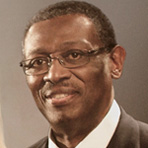Specialty
Frank Douglas
Pharmaceutical & Biomaterials Research
Self Exam
- Occupation: President & CEO of Austen BioInnovation Institute in Akron
- Alternative career choice: Lab based scientist
- What do rock stars and scienctists have in common: Passion, creativity and desire to bring joy and happiness to others.
- Musical Instrument I Play: None
- I tend to approach life: As if it is a wonderful journey in which there are no failures, only unexpected or unwanted outcomes. These outcomes always have the potential for self-discovery and awareness.
- Biggest misconceptions about me or my work: That it does not provide good work – life balance
- Worst part-time job ever: Packing boxes of women's and men's underwear in a mid-sized factory
- Longest med school study session: Studying pathology
- Best moment in medicine/research: "Approval of Lantus as a once daily treatment basal insulin for the treatment of diabetes. As head of R&D of Hoechst Marion Roussel, I ordered a new Ph 3 clinical study that would reveal its activity as truly once daily basal insulin. This provided better coverage than NPH to many diabetics. In a different instance, my team designed specific studies in subpopulations of patients, which demonstrated that although very select thromboxane synthase inhibitors effectively reduced thromboxane B2 in these patients, this was nonetheless not associated with clinical benefit. This led to termination of these programs and not only saved the company millions of dollars, but also avoided exposing additional patients to an ineffective agent"
About My Research
Disease Area/Research Area: My research area was hypertension with specific focus on how biogenic amines and small neuropeptides in the brain influence peripheral cardiovascular function. After joining the Pharmaceutical Industry (Ciba Geigy) I initially became responsible for the Phase 2a clinical trials and ADME studies. Thereafter, as Head of Research & Development I was responsible for research in several areas, including, Cardiovascular, Rheumatoid Arthritis, Diabetes, Anti-invectives, Oncology and Central Nervous System Diseases.
Science Impact/Accomplishments or Goal: My impact has been in increasing productivity and innovation in Research and Development, for which I was twice, awarded the Global Pharmaceutical R & D Director of the Year Award. Innovations included establishing Clinical Biology at Ciba Geigy, in 1984. This unit employed Koch's Postulates, including biomarkers, subgroup of patients in which to test clinical efficacy of novel mechanism based compounds. Clinical Biology was the forerunner of Translational Research and focus of testing hypotheses in rare or orphan diseases.
Organization of R&D into Research sites with responsibility for specific Disease Areas from Discovery to Ph 2a and focus on multidisciplinary teams as the units of innovation introduce this in 1997, the formal inclusion of clinical proof of concept testing within Research.
Introduction of Chemical Biology in R&D in Aventis in 2000, exploited the information that would become available from the newly deciphered human genome. It enabled focus on finding new targets, the biological structure of new targets and linked with combinatorial chemistry, the generation of target specific libraries of compounds for screening against new targets. This increased the potential to find compounds active against targets such as kinases.
These approaches contributed to the discovery, development and or approval of over 20 present marketed drugs, including: Allegra, Lantus, Actonel, Taxotere, and Lovenox.
Biography
“An award-winning industry veteran with more than 24 years of experience as a leader in healthcare, pharmaceutical research, and entrepreneurship, Douglas serves as day-to-day chief strategist for the Austen BioInnovation Institute in Akron, a new biomaterials institute built on a unique collaboration of five leading medical and educational institutions. He is University Professor in the Department of Polymer Science at the University of Akron, Professor of Integrated Medical Sciences at the Northeastern Ohio Universities College of Medicine and Pharmacy, senior fellow of the Ewing Marion Kauffman Foundation, and senior partner emeritus of PureTech Ventures (Boston, MA). At MIT, he was the Professor of the Practice in the MIT Sloan School of Management and also held similar appointments in the departments of biology, biological engineering, and the Harvard-MIT Division of Health Sciences and Technology and the founder and first executive director of the MIT Center for Biomedical Innovation.
Dr. Douglas was formerly executive vice president, chief scientific officer, and a member of the board of management of Aventis, where he headed drug innovation and approval, with global responsibilities for research, development, and regulatory and marketing support. A leader in innovation in pharmaceutical research and development, Dr. Douglas serves on multiple boards of directors, most recently joining that of the Multiple Myeloma Research Foundation, and the Ewing Marion Kauffman Foundation. He has also served as Chief Scientific Advisor of Bayer Healthcare, AG.
Dr. Douglas is the recipient of the 2007 Black History Makers Award and has been honored twice as the Global Pharmaceutical R&D Director of the Year, in recognition of his leadership and success in improving innovation and productivity in pharmaceutical companies. Other awards include: Louis B. Russell Memorial American Heart Association Award, the Chicago Heart Association’s Heart of the Year Award, the Center for Medicine in the Public Interest’s Odyssey Award, the National Organization of Chemists and Chemical Engineers – Lifetime Achievement Award, and Guyanese & American Business & Professional Council’s 2010 Honoree. He was involved in the discovery, development and/or approval of more than 20 medications. He has also received the Medal of Honor and an Honorary Professorship from the Johann Wolfgang von Goethe University, Frankfurt, Germany.
Dr. Douglas holds a PhD in physical chemistry and a MD from Cornell University. He did his internship and residency in internal medicine at the Johns Hopkins Medical Institution and a fellowship in neuroendocrinology at the National Institutes of Health.”


